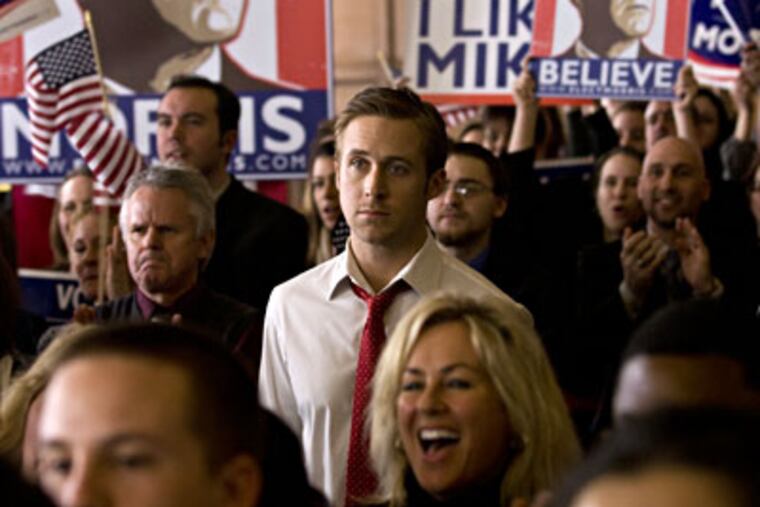'Ides of March' a star-spangled political warning
Never mind Chris Christie. George Clooney is the guy who should be running for president. At least the George Clooney who's standing at the debate podium in the early going of The Ides of March. As Mike Morris, governor of the great state of Pennsylvania, Clooney talks sense about the economy, about the country's messy military entanglements,

Never mind Christie. George Clooney is the guy who should be running for president.
At least the George Clooney who's standing at the debate podium in the early going of The Ides of March. As Mike Morris, governor of the great state of Pennsylvania, Clooney talks sense about the economy, about the country's messy military entanglements, about energy, education, taxes. As he tours Ohio, where a make-or-break primary is just days away, he engages students and office workers with neither condescension nor hyperbole, firing up the crowds with a straight-shooting stump speech, and smartly batting back inquiries from the press.
Next stop: another Pennsylvania address - as in 1600 Pennsylvania Avenue.
Of course, as the full-of-foreboding title suggests, things take a dire turn in The Ides of March. Adapted from Beau Willimon's play Farragut North, with a screenplay by Clooney and Grant Heslov, and with Clooney directing (as he did on his riveting Edward R. Murrow period piece, Good Night, and Good Luck), this taut cautionary tale explores the dark side of American politics.
And leaves the viewer to wonder - if anyone's still wondering - is there a bright side?
While Clooney's charismatic candidate is the figure everyone pivots around, the center of gravity in The Ides of March is Stephen Myers, a savvy, idealistic press secretary working to get Gov. Morris into the White House. Ryan Gosling's performance as Myers is easily among the best work he has done: You can see the intelligence in his eyes, and the passion, as Myers anticipates problems, weighs strategies, manages logistics, and finds time to fool around with a quick-witted young campaign volunteer. Evan Rachel Wood, on a run of good roles lately (her Veda in HBO's Mildred Pierce was chilling), is the - dare I say it - intern.
With echoes of many a modern-day campaign that begins with heady fervor and ends in sour disillusion, or worse, in scandal (John Edwards, anyone?), The Ides of March tracks the secret meetings and backroom deal-making that appear to be an inextricable part of the election process. Paul Giamatti hovers menacingly (in his inimitably rumpled way), playing the campaign manager of Morris' last-standing rival, and Philip Seymour Hoffman is the hard-bitten campaign veteran running things, and thinking things through, for Morris.
As a director, Clooney makes every moment count. He moves things along briskly, sharply - but also knows when to stop and observe, to take a more distant view. (The way Clooney shoots and frames a key scene in which Hoffman's Paul Zara steps into a tinted-windowed SUV for a final, fateful meeting is a study in restraint and unforced drama.)
There isn't a false note in The Ides of March, and some very fine actors - Jeffrey Wright as a powerful U.S. senator, Marisa Tomei as a predatory political reporter, Jennifer Ehle as Morris' wife - give substance and nuance to their brief time on screen.
Talk about a zeitgeist moment: The polls show a nation that has had it with the way government does business, or doesn't do business. The Ides of March wields its searchlight over our political landscape and finds a battlefield: a bloody ground of cynicism and fatal compromise.EndText